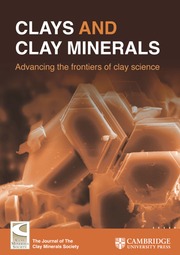Crossref Citations
This article has been cited by the following publications. This list is generated based on data provided by
Crossref.
de Donato, Philippe
Cheilletz, Alain
Barres, Odile
and
Yvon, Jacques
2004.
Infrared Spectroscopy of OD Vibrators in Minerals at Natural Dilution: Hydroxyl Groups in Talc and Kaolinite, and Structural Water in Beryl and Emerald.
Applied Spectroscopy,
Vol. 58,
Issue. 5,
p.
521.
Murashov, Vladimir V.
and
Demchuk, Eugene
2005.
Surface sites and unrelaxed surface energies of tetrahedral silica polymorphs and silicate.
Surface Science,
Vol. 595,
Issue. 1-3,
p.
6.
Murashov, Vladimir V.
and
Demchuk, Eugene
2005.
A Comparative Study of Unrelaxed Surfaces on Quartz and Kaolinite, Using the Periodic Density Functional Theory.
The Journal of Physical Chemistry B,
Vol. 109,
Issue. 21,
p.
10835.
Papoulis, D.
Tsolis-Katagas, P.
Tsikouras, B.
and
Katagas, C.
2005.
The South Aegean Active Volcanic Arc - Present Knowledge and Future Perspectives, Milos Conferences.
Vol. 7,
Issue. ,
p.
293.
Burzo, E.
2007.
Phyllosilicates.
p.
366.
Balan, E.
Lazzeri, M.
Mauri, F.
and
Calas, G.
2007.
Structure, reactivity and spectroscopic properties of minerals from lateritic soils: insights from ab initio calculations.
European Journal of Soil Science,
Vol. 58,
Issue. 4,
p.
870.
Burzo, E.
2009.
Phyllosilicates.
Vol. 27I5b,
Issue. ,
p.
107.
Johnston, C. T.
2010.
Probing the nanoscale architecture of clay minerals.
Clay Minerals,
Vol. 45,
Issue. 3,
p.
245.
2010.
Photoacoustic IR Spectroscopy.
p.
143.
Madejová, Jana
Balan, Etienne
and
Petit, Sabine
2010.
Advances in the characterization of industrial minerals.
p.
171.
Smrčok, Ľubomír
Tunega, Daniel
Ramirez-Cuesta, Anibal Javier
and
Scholtzová, Eva
2010.
The combined inelastic neutron scattering and solid state DFT study of hydrogen atoms dynamics in a highly ordered kaolinite.
Physics and Chemistry of Minerals,
Vol. 37,
Issue. 8,
p.
571.
Brigatti, Maria Franca
Malferrari, Daniele
Laurora, Angela
and
Elmi, Chiara
2011.
Layered Mineral Structures and their Application in Advanced
Technologies.
p.
1.
Fukuda, Jun-ichi
Okudaira, Takamoto
Satsukawa, Takako
and
Michibayashi, Katsuyoshi
2012.
Solution–precipitation of K-feldspar in deformed granitoids and its relationship to the distribution of water.
Tectonophysics,
Vol. 532-535,
Issue. ,
p.
175.
Spence, Adrian
and
Kelleher, Brian P.
2012.
FT-IR spectroscopic analysis of kaolinite–microbial interactions.
Vibrational Spectroscopy,
Vol. 61,
Issue. ,
p.
151.
Wei, Xiao-hui
Zhou, Rulong
Balamurugan, B.
Skomski, Ralph
Zeng, Xiao Cheng
and
Sellmyer, D. J.
2012.
Experimental and theoretical studies of hydroxyl-induced magnetism in TiO nanoclusters.
Nanoscale,
Vol. 4,
Issue. 24,
p.
7704.
Cuadros, Javier
Vega, Raquel
and
Toscano, Alejandro
2015.
Mid-Infrared Features of Kaolinite-Dickite.
Clays and Clay Minerals,
Vol. 63,
Issue. 2,
p.
73.
Zhang, Li
and
Jin, Zhenmin
2016.
High-temperature metamorphism of the Yushugou ophiolitic slice: Late Devonian subduction of seamount and mid-oceanic ridge in the South Tianshan orogen.
Journal of Asian Earth Sciences,
Vol. 132,
Issue. ,
p.
75.
Zhang, Li
Zhang, Junfeng
and
Jin, Zhenmin
2016.
Metamorphic P–T–water conditions of the Yushugou granulites from the southeastern Tianshan orogen: Implications for Paleozoic accretionary orogeny.
Gondwana Research,
Vol. 29,
Issue. 1,
p.
264.
2017.
Infrared and Raman Spectroscopies of Clay Minerals.
Vol. 8,
Issue. ,
p.
515.
Kloprogge, J.T.
2017.
Infrared and Raman Spectroscopies of Clay Minerals.
Vol. 8,
Issue. ,
p.
150.


